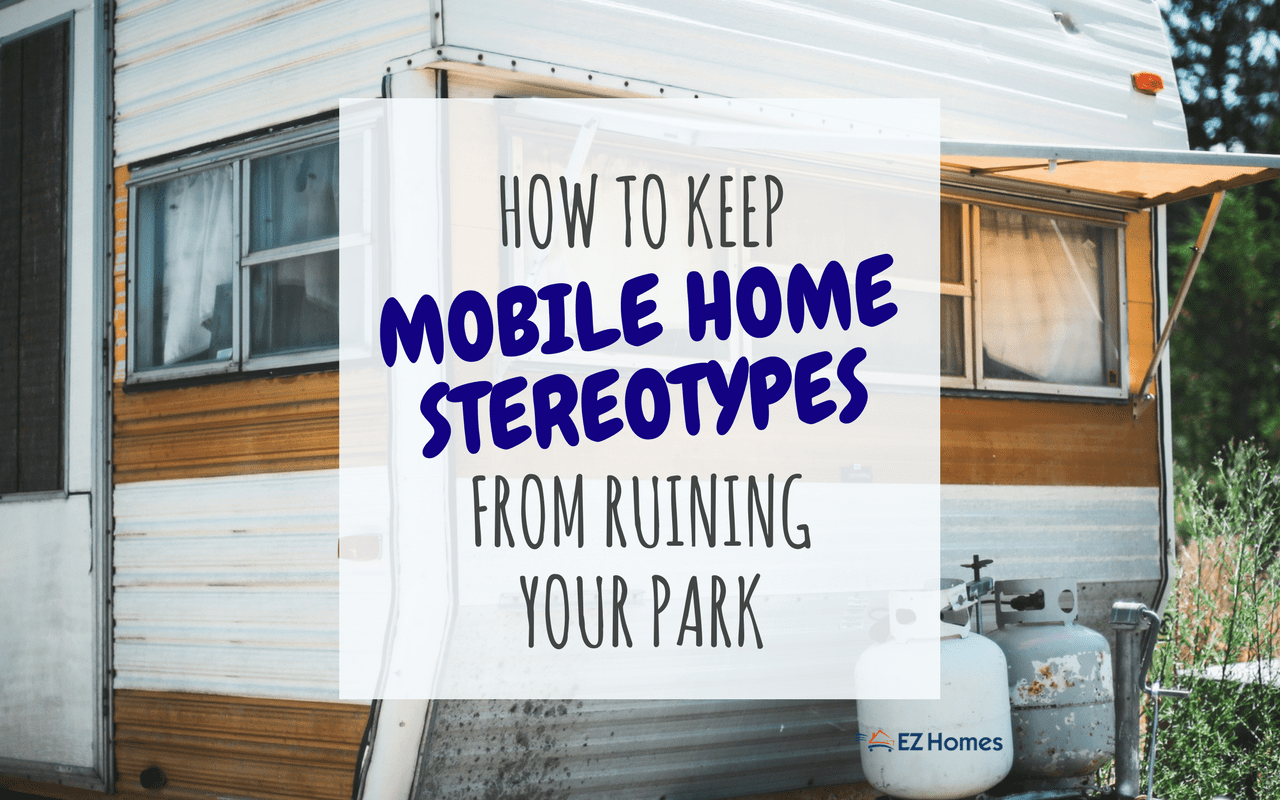As a mobile home park owner, it might fill you with a frustrating sense of irony to learn that most mobile home stereotypes we sit with today are either because of a lack of awareness, people operating on outdated information, and just plain superstition. This sometimes leads people to call mobile homes ridiculous names like “tornado magnets” or “tinderboxes” as well as their inhabitants labeled “trailer trash.”

Mudslinging
A lot of the time, stereotypes do have their basis in fact, why would they exist otherwise? However, stereotypes often fail to include the context, as well as any other related information, that should form part of someone’s reasoning.
Unfortunately, mobile homes are partly stereotyped because of their history which isn’t all that squeaky clean. However, most of these issues have already been identified and addressed. Today’s manufactured homes are leagues ahead of what we used to know as mobile homes from the 1970’s and early 80’s.
Can The Mud Be Cleaned?
If kept in good condition and treated like any other valuable piece of property, mobile homes can deliver the complete American family experience at a fraction of the cost of traditional real estate. Many mobile homes look gorgeous. And many mobile home parks have a community feel that is hard to replicatein other residential developments.
That’s what we want to highlight in this article. As a mobile home owner, you want prospective tenants to see your park for what it really is and not rely on these outdated and unfair stereotypes. To do this, you need to put extra effort into the image of your mobile home park.
So, let’s look at what stereotypes exist, where they come from, and how you can keep them from ruining your park.
Many of these solutions revolve around the idea of prevention is better than cure. By following them, you will stop any unfortunate incidents from occurring that could give the mobile home doubters out there reason to go “Ha! I knew mobile homes were bad”.
Common mobile home stereotypes and how to combat them
“Mobile homes are tinderboxes.”
Where does it come from?
Before the introduction of the HUD code in 1976, there was very little (if any) regulations, standards or guidelines that ensured the build-quality and safety of “mobile homes.” These homes actually reflected something closer to what we would currently call a trailer home.
Because of this, many manufacturers used sub-par materials. One of the first safety aspects that suffered under this was fire safety. In most cases, fires were the result of human negligence. However, the way these trailer homes went up in flames and the nearly unstoppable nature of these fires quickly caused them to be labeled them as fire hazards.
What can you do about it?
Today, the HUD code strictly stipulates and enforces standards and guidelines to ensure the safety of manufactured homes. This code went into effect in 1976. Most of the guidelines surrounding fire safety and prevention are built on the NFPA 501 rules. Any home that doesn’t adhere to these rules is not HUD compliant.
A good starting point then is to restrict mobile homes manufactured before 1976. You can verify HUD compliance by looking for the red and white HUD plate located somewhere on the chassis.
The NFPA and the HUD code give very clear instructions regarding fire safety, which you can check easily. For instance:
- Factory installed fire-alarms that are all in working order and are located adjacent to sleeping rooms, the kitchen, and a fireplace (if any).
- The home must be easy for disabled persons to evacuate.
- There have to be at least two egress doors.
- Kitchens and other cooking areas must have ventilation systems.
- The spacing between mobile homes on their lots must follow local regulations.
- A fire extinguisher that is serviced and in working order.
If you own the mobile homes and want to renovate or if buyers ask to make improvements themselves, you should make sure of the following:
- Use of flame retardant insulation.
- Use of flame retardant materials when constructing or adding to the home.
- Only licensed electricians work with electrical systems.
There are many other guidelines. We recommend that you familiarise yourself with the NFPA 501 and the relevant sections in the HUD code. Fire safety is a big deal and is also why it’s the biggest section on this list.
“Mobile homes are made of low-quality materials.”
Where does it come from?
The reasons for this one is twofold. For one, it’s just human nature to be immediately suspicious and a touch cynical. Mobile homes cost less than traditional homes so they must be logically inferior. Otherwise, why wouldn’t we just build stick-built homes of the same materials?
Even though mobile homes aren’t nearly as mobile anymore, there are reasons why they have different and less expensive materials.
- Bricks and cement may be useful and sturdy, but they don’t lend themselves well to the manufacturing process. Mobile home builders use materials that are easy to assemble in a factory setting.
- Manufactured homes are constructed in a factory and transported to the site. This means they have to be made of lighter materials for purely logistical reasons. These lighter materials are also often cheaper.
- Market conditions demand that mobile homes be made of cheaper materials because there is a huge need for affordable housing.
This stereotype also leads people to believe that mobile homes are in chronic need of repairs. While mobile homes need a lot of care and checking up to remain in tip-top condition, repairs and renovations are often much cheaper and easier. This tends to balance the scales.
What can you do about it?
As we mentioned, manufactured homes today have come a long way from their roots. The HUD code, along with an improved manufacturing process, access to better materials, and more competition have led to vastly superior homes.
Yes, in many ways they aren’t on the same level as stick-built homes. However, it might surprise you to know that in some ways they are ahead. Take plumbing for example. Mobile homes have newer types of plumbing such as PEX pipes which are overall much better than the copper pipes in most traditional homes.
What you can do is to limit the allowed age of mobile homes on your property. This is a fairly common restriction in mobile home parks. You could say that only homes built after 1989 are allowed or only homes that are 12-years old.
You can also inspect the quality of the model, the reputation of the manufacturer, the adherence to the HUD code, and restrict modifications to reputable and certified contractors.
“Mobile homes are all ugly.”
Where does it come from?
This one makes us throw our hands up in the air with disgust even though it is a very common misconception. This particular stereotype stems largely from how the media portrays manufactured homes. Throw on top of that our memories of trailer homes from the 1970’s.
Yes, mobile homes do usually have a slightly more boxy design. And yes, their looks aren’t always one of the leading factors taken into account during the manufacturing process. However, in the end, it all comes down to the owner, their tastes, and how much effort they put into their home. Not all stick-built homes are attractive either, right?
What can you do about it?
Once again, newer homes often look better. If you want to have a mobile home that is pleasing to the eye, an age restriction on the homes might be one way to go.
Another way is to stipulate appearance guidelines for the homes in your park. This is a very common caveat in many mobile home parks. You could say that mobile homes need to adhere to a certain color scheme. Or that owners need to seek approval before altering the appearance of the home. Or that the yard has to be kept in good condition.
“Mobile homes are tornado magnets.”
Where does it come from?
This one is obviously bogus. There is nothing about mobile homes that can in any way attract a tornado. Neither can any other inanimate object for that matter. It just so happens to be that some of the states with the highest number of mobile homes and mobile home parks are also states that see the highest number of tornadoes per year.
Unfortunately, we can’t dispute the fact that mobile homes don’t stand up to tornadoes as well as stick-built homes. Since even most stick-built homes get almost completely wiped out by these forces of nature, it’s easy to imagine what happens to the much thinner and lighter materials of a mobile home.
Still, the fact remains that you aren’t more susceptible to tornadoes by living in a mobile home. And the fact of the matter is that replacing a mobile home can cost less than the restoration of your stick-built home.
What can you do about it?
We aren’t going to suggest you do anything about tornadoes. That would be almost as ridiculous as calling mobile homes tornado magnets in the first place. However, there are steps that you can take to isolate yourself from this natural disaster or to at least mitigate damages and fatalities.
Firstly, you should avoid building or buying a mobile home park in high-risk states. Alabama, Oklahoma, Iowa, Kansas, and Texas have the worst track record when it comes to tornadoes.
Secondly, ensure that all homes in your park are zoned for the wind and storm conditions in your area. Zoning assignments follow a few different weather patterns such as wind resistance and snow. You can check your area’s zoning requirements with the local authorities and make sure you only allow correctly zoned homes.
“Mobile home residents are all trailer trash.”
Where does it come from?
“People that stay in mobile homes are criminals.” “They don’t pay their rent, they are undesirables, they are poor.” Sadly, most of us have heard these unfair comments leveled at mobile home owners or tenants.
This stereotype probably has its roots in the fact that the older mobile homes and trailer homes were built to low standards, weren’t all that appealing, and were meant for people who really couldn’t afford any better.
What can you do about it?
People base most of their judgments on first impressions. The best thing you can do to change their perceptions is to run an immaculate mobile home park. To do this, you will need the help of your residents.
Try to foster a sense of responsibility and pride in your community. If you need to, use your lease agreements and veto right as landlord to maintain proper appearances and be a little picky about who and what you let into your park.
The truth of the matter is that the U.S. is currently facing an affordable housing crisis. A large chunk of the population can’t afford an apartment or condo rental or to buy a stick-built home. A mobile home offers many of the same comforts at less than half the price.
If you are facing someone whose mind is hard to change, just show them this multi-million dollar mobile home park in Malibu.
You can overcome mobile home stereotypes and take pride in your park!
There you have it! Put out those mobile home stereotypes for good by running a model community that just happens to consist of mobile homes. As your park’s reputation soars, so will the number of applicants wanting to live there. Here are a few tips to help you decide if a prospective tenant is a good fit for your park.





